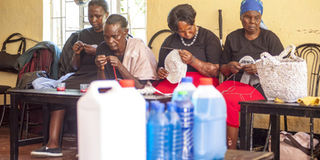Visually impaired women weave their way out of poverty

Visually impaired women knitting at the Sisterhood Blind Women Group workshop at Section 58 in Nakuru. The group consisting of 30 members produces ornaments, accessories and detergents among other products. They have called on the Nakuru County government to come up with kitty for woman-headed households and women-maintained families. PHOTO/SULEIMAN MBATIAH.
What you need to know:
- The group, which currently comprises of 30 women, amongst them former street beggars from the busy streets of Nakuru Town have walked their way out of poverty to self-dependence using their skills.
- With the earnings from their products such as earrings, necklaces and bangles which retails for between Sh100-300 and weaved bags which go for Sh500, most of them have been able to provide for their families
- Lack of guides to take them to the meetings has made them reduce the number of times they meet in a month.
By CHEBET CAROLINE and MAGDALENE WANJA
A group of visually impaired women in Nakuru has defied the norm that they must beg for a living while sitting on a dusty pavement with a bowl at hand the whole day long.
Ability, courage and motivation is what has driven Sisterhood Blind Women in Nakuru have come together to fight poverty by sheer hard work and commitment.
The group, which currently comprises of 30 women, amongst them former street beggars from the busy streets of Nakuru Town have walked their way out of poverty to self-dependence using their skills.
They are also keen on training others on effective ways of fending for themselves.
Their plight worsened after some were widowed and others abandoned by their night-time lovers.
But Ms Hellen Nderu encouraged them to 'reclaim' their lives by getting them out of the streets to start a cottage industry.
She started living with them at her home.
"At the beginning, it was a challenge convincing beggars on the streets who were used to quick money to abandon the habit and venture into business.
OWN SWEAT
But with time some accepted the idea and they are now earning a living from their own sweat", Ms Nderu said.
The women were trained on how to use their hands to knit, weave, make decorative ornaments as well as detergents.
This saw them start getting good income from a paltry Sh10,000 capital.
As their sales soared, they formed a self-regulating savings scheme.
Each would contribute Sh50 every month under the leadership of their chairlady, Ms Phylis Njeri.
The money is intended to be used to purchase a residential plot that will also serve as the centre for their cottage industry.
“Since we came together we have always had one dream to save the little we have so that we can we can buy a plot and construct our houses some day.
All of us still have a challenge of paying rent”, she said.
With the earnings from their products such as earrings, necklaces and bangles which retails for between Sh100-300 and weaved bags which go for Sh500, most of them have been able to provide for their families.
Others have also been able to pay school fees for their children.
At every meeting, the group is able to make between 60 to 100 litres of detergent.
PROFIT
This they say can earn them a profit of up to Sh3,000 for every 40 litres of detergent after the sales.
Currently, the group gets orders to supply their products like sweaters to schools.
The detergent is also sold to local hotels, butcheries, supermarkets and to individual clients.
The booming trade in decorative items has made them popular especially with teenagers keen on getting noticed by donning locally made necklaces, earrings and bangles.
But the group is not able to meet regularly due to lack of adequate space at their founder's home.
This made each of them to move out and rent a room.
LACK GUIDES
Lack of guides to take them to the meetings has made them reduce the number of times they meet in a month.
“We meet twice a month because of lack of guides to lead us to Nderu’s home once we alight from matatus.
This means we have to mostly communicate via mobile phones,” added Njeri.
Their efforts have been bearing fruit with more members seeking to join them and help them meet the demand for their products fuelled by the pop-culture among youths.
Ms Nderu said their wish to get visually impaired beggars out of the streets is being hampered by Nakuru residents who have a 'generous' heart of giving hand-outs to the few remaining women who are still used to begging money on the streets.
“We seek help to buy machines for them but not hand-outs since with such a machines, one can easily and comfortably earn a living,” says Ms Njeri.




